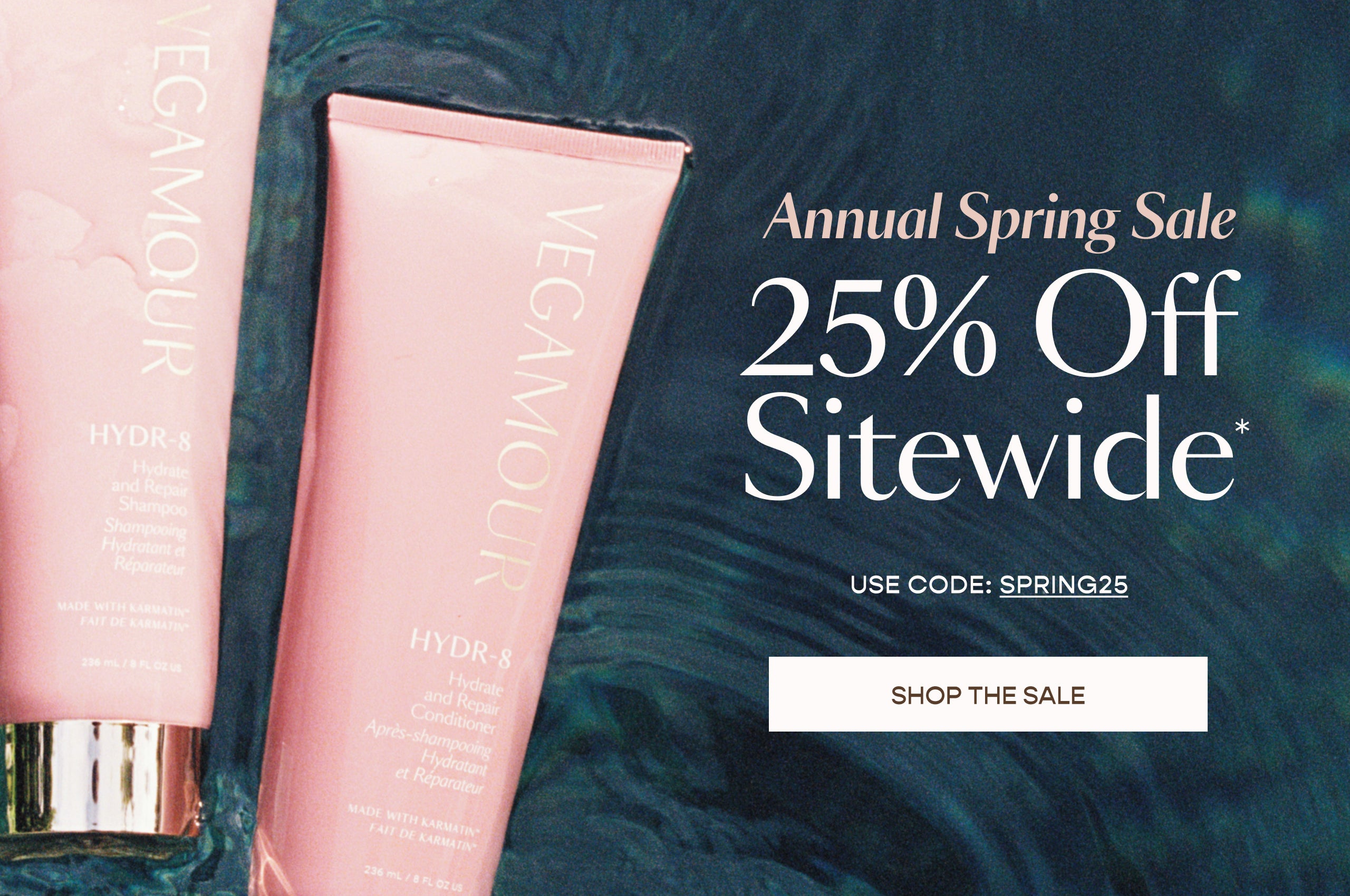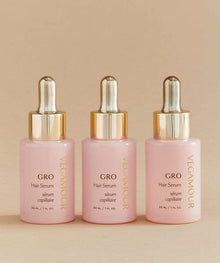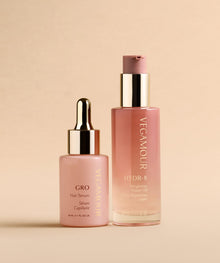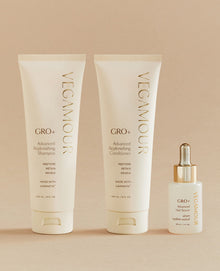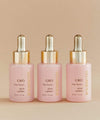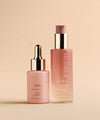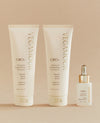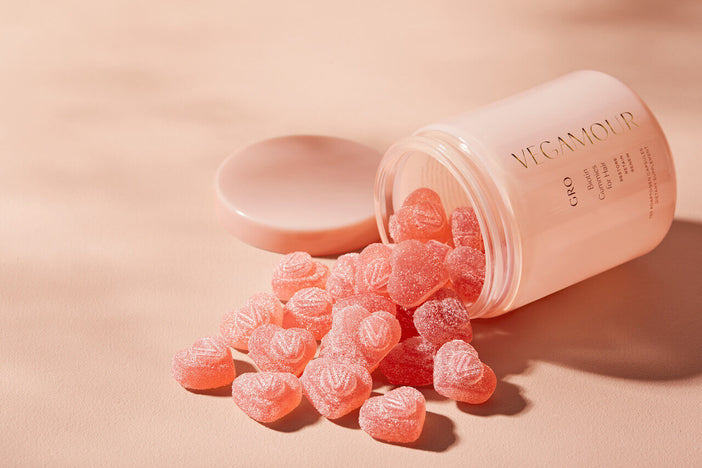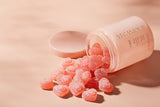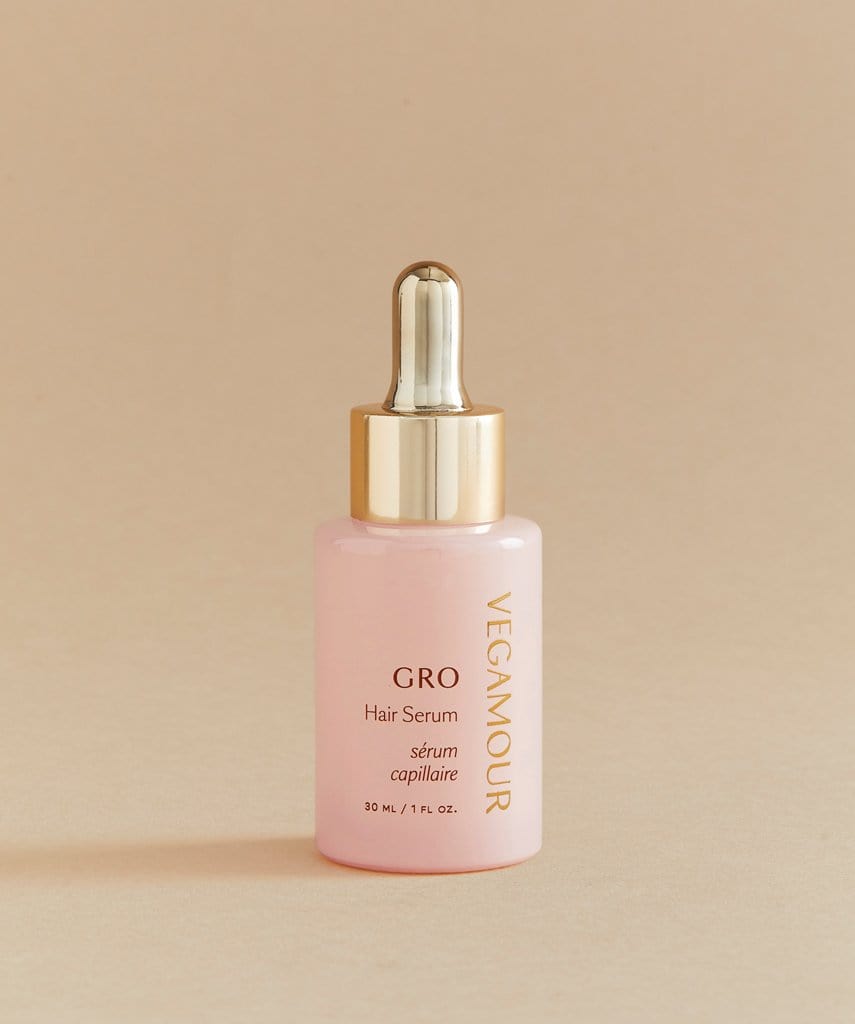How to Identify the Best Hair Supplements
When you see influencers on Instagram insisting their go-to hair supplement is responsible for their long, thick strands, it’s easy to raise an eyebrow. But here’s the good news: hair supplements actually do work — and if you know what to look for you can find the right one.
Good supplements for hair growth are the ones that have been carefully formulated with an understanding that growing luscious and thicker hair is a holistic concern. It takes a village, so to speak. To provide your scalp and follicles all they need to function at their prime, you need to nourish your body from the inside and out!
If you’re wondering how to identify and choose hair growth vitamins, then start with some foundational knowledge around what your body and scalp need to thrive. Here’s the lowdown.
First, Reframe Your Concept of Hair Health
What does “a holistic approach” to hair health mean anyway? For us here at VEGAMOUR, healthy hair begins with a healthy scalp and a healthy scalp is an important part of a healthy body.
Can we let you in on a little secret? Some products will claim they can regrow your hair, but the truth is if you want to really nail the healthy hair game you have to take care of, well, your health.
This means thinking about things like:
So holistic beauty, the kind we’re crazy about at VEGAMOUR, means taking a bird’s eye view on your health and supporting it with all-natural clean beauty products that will promote your hair health from the outside (hello, our beloved GRO Hair Serum) and inside (hello, all-vegan GRO+ Advanced Gummies.
Let’s break down what a body needs for optimal hair health.
What Are the Best Vitamins, Minerals & Nutrients You Want In A Supplement for Hair Growth?
With so many options out there it can be daunting to find the best hair growth supplement, but the key is to have a little ace up your sleeve.
That ace is knowledge, and knowing which supplement to choose really comes down to knowing what vitamins, minerals, adaptogens and other plant allies are scientifically-backed for hair health. So what are the best vitamins for hair growth? Here they are:
Vitamin B-7 (Biotin)
You’ve probably heard of biotin, since it’s a mainstay in hair supplements and hugely popular at the moment. Biotin supplements can be great for folks who have a biotin deficiency and are experiencing hair loss. But if you aren’t deficient in biotin, then relying on an isolated biotin supplement probably won’t help much.
That said, it is a pillar for healthy hair and nails. “Biotin is essential for the production of a hair protein called keratin,” explained Dr. Ailynne Marie Vergara-Wijangco, a clinical dermatologist with ThankYourSkin. So it should definitely be part of a larger ensemble of vitamins and nutrients in any supplement you buy.
Read: Biotin Benefits for Hair, Skin and Nails
Vitamin D-3
Hair follicles are highly sensitive to hormones. Vitamin D (yes, it’s a hormone!) can play a super-important role to support healthy hair growth. In fact, research shows low levels of vitamin D are linked to hair loss.
“Living and working mostly indoors has made many people deficient in vitamin D, and this deficiency has been linked with alopecia and a host of other health problems. We usually recommend that people take vitamin D supplements, as well as try to get it through food sources such as mushrooms and wild-caught fatty fish,” shared Dr. Carrie Lam, a medical doctor specializing in anti-aging and regenerative medicine with Dr. Lam Coaching.
Shop: Nicole Franzel's Healthy Hair Product Picks
Vitamin B-5 (Pantothenic Acid)
Pantothenic acid, or vitamin B5, is often referred to as the “anti-stress vitamin” because of its ability to regulate stress hormones in the adrenal cortex. Guess what? Stress impacts hair health in so many ways!
When it comes to hair, B-5 is known for nourishing and strengthening hair follicles for healthier hair growth, along with being beneficial for bouncy strands by increasing the water content and elasticity.
Vitamin E (Tocopheryl Acetate)
“Vitamin E is known as the hair, skin, and nails vitamin—and for good reason. It’s a powerful antioxidant that can make your scalp healthier. And a healthy scalp is what grows healthy hair. It is one of the most important vitamins for hair growth for those with alopecia, and it can be used internally or topically,” shared Dr. Lam.
Wow! Did you know how important vitamin E is for healthy hair and radiant skin? Not only that, but it has potent antioxidant properties that are extremely beneficial to hair health. One study showed that after supplementing vitamin E for eight months, a focus group experienced a 34.5% increase in hair growth.
See: VEGAMOUR Before & After Photos
Zinc
Zinc is one of the key nutrients in repairing and maintaining scalp health. “Zinc is especially good for keeping the oil glands at the hair follicle moist for shiny and lush hair,” said Morgyn Clair, registered dietitian nutritionist with Sprint Kitchen.
The mineral encourages hair tissue to grow and repair itself, and it also plays an important role in keeping the hair follicles and oil glands healthy. Studies have shown that zinc supplements improved hair growth in those with zinc deficiency.
“Zinc is essential for hair growth, though I would recommend treading lightly with zinc. Taking too much supplemental zinc can lead to the depletion of other important minerals, like copper,” advised Ana Reisdorf, registered dietician with Wellness Verge. According to the Mayo Clinic, the recommended daily amount of zinc is 8 milligrams (mg) for adult women and 11 mg for adult men.
Vitamin C
Antioxidants are so important to our general health, since they combat free radical damage and work to keep oxidative stress at bay. (Yup, free radical damage and oxidative stress impact your hair, too.) Good thing vitamin C is one of the best antioxidants out there.
“Vitamin C is an immune-boosting, free radical neutralizing powerhouse. It also helps your body absorb iron, which is another nutrient your hair needs. Plus, vitamin C is used by your body to produce collagen, one of the main proteins that your hair is made of,” explained Dr. Lam. Case closed.
Iron
Speaking of iron, iron-deficiency anemia can lead to hair loss. It’s also a condition that is quite common in women, vegetarians and vegans. When you don’t have enough iron, it becomes harder for your follicles to get the blood circulation and nutrients they need to thrive.
“Anemia is another cause of hair loss, and it is quite common in women due to blood loss from menstruation. Iron supplements can be a little difficult on the gastrointestinal tract and can cause constipation. If that’s the case for you, try to incorporate more iron-rich foods and if you do supplement, make sure that you also take vitamin C to help with absorption,” advised Dr. Lam.
Vitamin B-6
Vitamin B6 is an important member of the Vitamin B-complex family, and it is actively involved in protein metabolism in the body. It’s also a key player in the processes that ensure our follicles get enough of the key building blocks for hair strands: keratin and melanin.
Another way B-6 impacts hair health is through its impact on hormones. It’s important for regulating a class of hormones, called androgens, that directly impact hair growth. In one study it was shown that supplementing with B-6 had positive impacts on hair growth by curbing the formation of DHT.
Vitamin A
All of the cells in our bodies need vitamin A—period. Vitamin A is essential for things like normal vision, the healthy functioning of your immune system, and for reproduction. It also helps the heart, lungs, kidneys, and other organs maintain healthy day-to-day functioning.
Vitamin A is also crucially important for hair growth. “Vitamin A is important for all cell growth, including hair cells. It also supports sebum production,” Dr. Lam explained. Sebum is an oily and waxy substance produced by the sebaceous glands, and it keeps our scalp moisturized and protected, which in turn keeps our hair and the surrounding environment healthy.
But don’t overdo it! “Too much vitamin A can actually speed up hair loss,” shared Dr. Lam. According to The Mayo Clinic, the recommended daily value is 900 micrograms (mcg) for adult men and 700 mcg for adult women.
Vitamin B-9 (Folic Acid)
Folate or folic acid is a water-soluble B vitamin (B-9, to be precise) that promotes healthy cell growth in your hair and nails, it also helps keep those all-important red blood cells healthy.
When it comes to hair wellness, vitamin B-9 can stimulate growth and create a stronger environment for your mane in general. Deficiencies in B-9 have been linked to premature graying.
Also: 3 Ways Nutrition Affects Your Hair
Vitamin B-12
Another oh-so important member of the B fam is vitamin B-12, and it is used by every cell in the body. It helps keep your nervous system functioning normally and plays an important role in DNA production.
Crucially for your hair, it helps your body metabolise amino acids (the building blocks of hair). It also helps keep your red blood cells healthy, allowing them to supply adequate oxygen to your tissues (including your hair follicles).
“Many people, especially vegetarians and vegans, are deficient in vitamin B12. So, it’s very important to supplement in such cases,” explained Dr. Lam.
Collagen
Collagen is the most abundant protein in your body, needed for building tendons, ligaments and your skin.
When it comes to hair, collagen can offer some of the amino acids needed to build hair: proline, glycine, and hydroxyproline. Collagen might also be a source of antioxidants, which means it could also provide protection from free-radical damage. Supplementing with collagen might also help protect against age-related thinning hair by replenishing the collagen supply that is naturally diminished as we age.
“Collagen supplements have been all the craze lately, as they can really promote hair growth, skin elasticity, and nail strength” commented Dr. Lam.
Find Out: Collagen & Biotin: Which One Is Right For You?
The Plant Power You Want In A Supplement
Let’s turn our attention to the plant allies that can help us on our quest for holistic hair health. Whether impacting hair growth directly or by encouraging the optimal conditions our body needs to grow beautiful hair, these powerful plants have got you covered.
Cannabidiol
CBD, you know it. Maybe you even love it. But what does it have to do with hair growth? Great question!
Cannabidiol (CBD) is a pretty impressive molecule, acting to help with serious health conditions while also working to support your general health on the day-to-day. How does it do it? By offering up three powerful global benefits that work to keep your body balanced. CBD can fight inflammation, soothe stress and anxiety, and act as a potent antioxidant. It might come as no surprise to learn that all three of these concerns—inflammation, stress and oxidative stress—can impact hair growth or contribute to hair thinning and loss.
Ashwagandha
If you’ve heard of adaptogens, chances are you already know ashwagandha. If you don’t, ashwagandha is a plant that has been used for thousands of years in the ancient Indian practice of alternative medicine called Ayurveda.
Adaptogens are compounds that help our bodies adapt to environmental and physical stressors, and when it comes to hair this is how ashwagandha helps. Like CBD, it works to help your body stay balanced and ready to grow its best hair. It can reduce cortisol (aka the stress hormone) levels, fight inflammation, and even boost your immune system.
Find Out: Everything You Need to Know About Ashwagandha & Hair
Saw Palmetto
When the hormone testosterone is converted into a molecule, it’s known as DHT, which has been linked to hair loss. Saw palmetto is a plant with small berries that have been shown to slow down the conversion of testosterone to DHT, which is why the botanical makes a great addition to a hair growth plan. One study showed an 11.9 percent hair growth increase among 25 participants over four months.
It has also been shown to have soothing anti-inflammatory properties, along with being a solid antioxidant.
Learn: Everything You Should Know About Saw Palmetto for Hair Loss
Your All-In-One Hair Health Solution
We’ve been talking about a holistic approach to hair health, but let’s underscore this key point one more time: your hair wellness game needs to be about living a healthy lifestyle while balancing both what you put on and in your body.
Topicals effectively target specific problem areas while ingestibles circulate nutrients throughout the body to address general, overall wellness from the inside.
So, we’d like you to meet these hair wellness game changers that will totally transform your hair care routine.
We’ve distilled all the hair health wisdom we could get our hands on to formulate our gluten-free vegan GRO Biotin Gummies. Don’t let the name fool you, these naturally flavored multivitamins will give you biotin along with everything else you need, including all of the hair health boosters we’ve covered here: vitamins A, E, B-6, zinc, folate and more! And if you want to take it to the next level, GRO+ Advanced Gummies gives you all this goodness plus the power of broad-spectrum CBD.
The Takeaway
The key to finding the right dietary supplements for hair is knowing what to look for! Hair health is a holistic concern, and in order to best nourish your scalp and follicles you need to support your body from the inside and out. Remember, always consult with a doctor before you add a new supplement to your daily routine! And, be patient.
“It’s important to keep your expectations in check,” advised Dr. Lam. It takes time for supplements to do their work, and then it takes time to see visibly stronger and thicker hair! It might take a solid month before you start to notice differences in your everyday health, and since hair grows about a half an inch a month you should expect to see visible new hair growth and increased hair density after about three months.
More From VEGAMOUR
- Hair Feeling Oily or Greasy? Try This
- What Is Forest Bathing? How to Relieve Stress Outdoors
- Review: These Biotin Gummies Changed My Hair!
- Are Baby Hairs a Sign of New Growth or Breakage?
